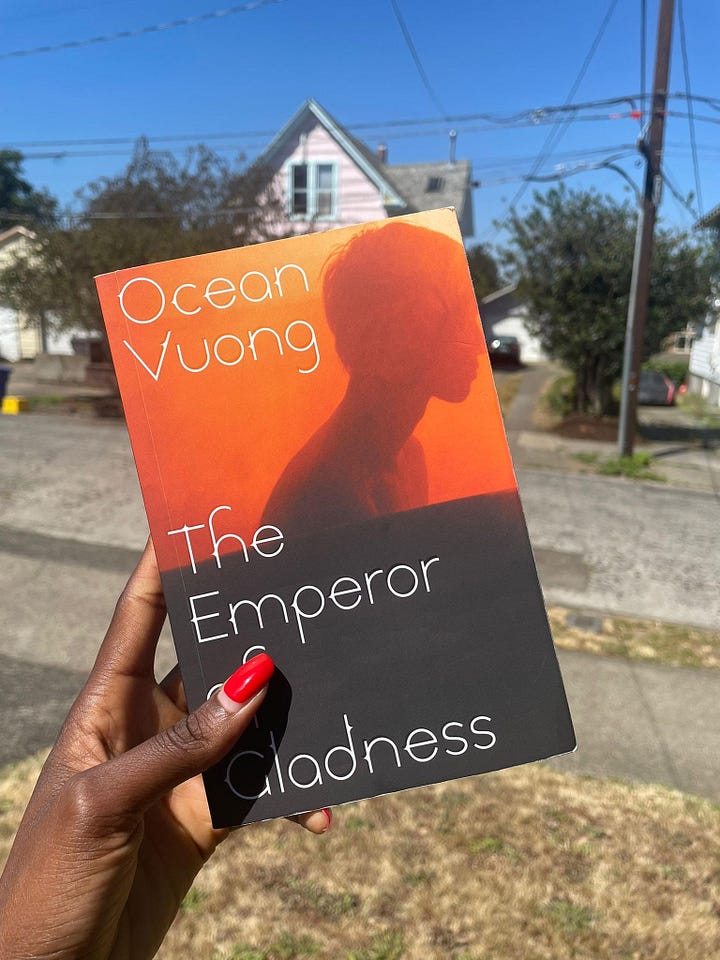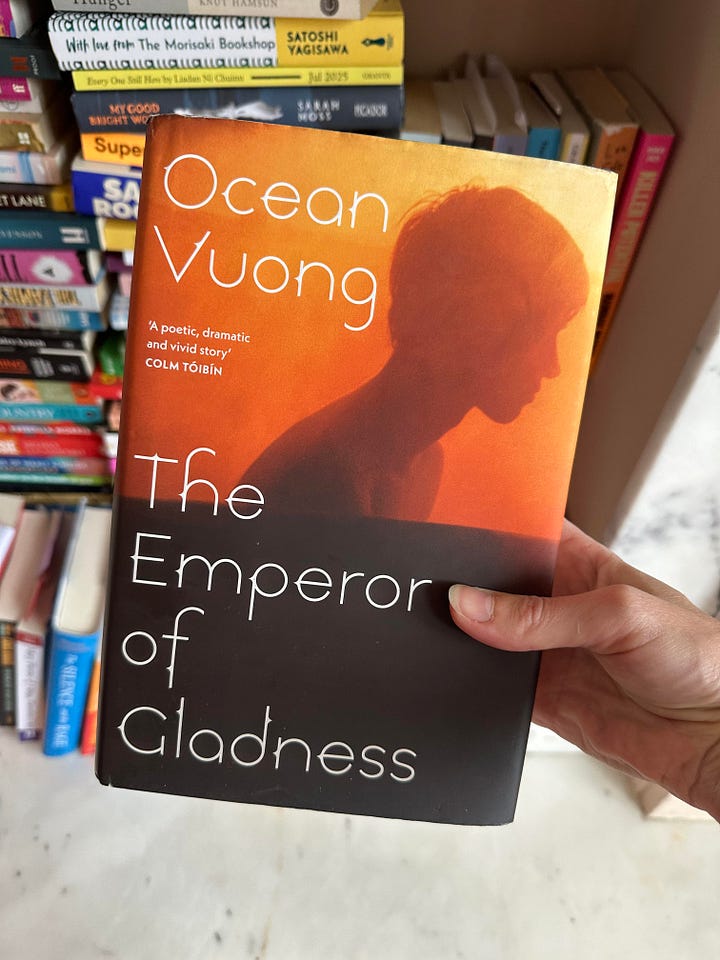2 Girls 1 Book: The Emperor of Gladness by Ocean Vuong
His debut was a cult bestseller. Can Ocean Vuong's second novel hit the same sweet spot?
Welcome to the sixth edition of 2 Girls 1 Book, a monthly cross-post where Ochuko and Pandora chat about a new book via Google docs. This month we’re talking about The Emperor of Gladness, the second novel from Ocean Vuong. As ever, we’d LOVE to hear from you in the Comments. And for those of you who like to read along, next month we will be reading Lonely Crowds by Stephanie Wambugu [linking to Amazon just this once as it’s not avail on Bookshop.org!]
One summer evening in the fictional town of East Gladness, Connecticut, nineteen-year-old Hai, a college dropout and recovering addict, stands on a bridge, ready to end his life. Just as he’s about to jump, a voice calls out from across the river. It belongs to Grazina, an elderly widow slipping into dementia. Hai becomes her caretaker, and over the course of a year, the unlikely pair forms a life-altering friendship. To support them both, Hai takes a job at a local diner, where his coworkers, each navigating their own quiet struggles, become the family he never expected. United by desperation and circumstance, and existing on the fringes a society grappling with its own hardships, together, they bear witness to each other’s survival.


Ochuko, I’ve been so keen to hear what you thought of this. I came to the book as a massive fan of [Vuong’s 2020 debut] On Earth We’re Briefly Gorgeous. I was also aware of how polarised the reviews have been so far.
Oh Pandora, Pandora. How I wish I didn’t have to read this book when I did. I really struggled with this one. And I tried. Lord knows, I tried. What was your experience?
Interested in your point about timing. As in—would there have been a better time for you to read it?
I don’t think this is a great summer read, I guess is my point. If this were winter, and I was in my bed, candle burning, I could have enjoyed this…
Ohhh, you go in for the whole ‘summer read’ thing! I do not. I like to read heavy non-fiction on a sun-lounger. Although I was thinking the other day that I might only take chunky novels on my summer holiday this year: Marian Keyes, Maeve Binchy, Wild Swans. Escape, for once.
That’s the thing, though, I do not! This is actually the first time I’ve ever thought, Oh gosh, I can’t do this. The narrative was both heavy and plotless in a way that made it hard for me to tune in. But maybe I just didn’t enjoy this book and am finding excuses because I’m embarrassed for myself.
No excuses needed, no embarrassment allowed. I don’t think it worked like his debut did. I kind of sensed that it would not, which is why I really wanted you to read On Earth… first, but you were not for turning! This book explores similar things to his first: the opioid crisis, the precarity of gig work/ work in America, being a queer Vietnamese immigrant in America (although queerness is much less of a storyline in this). Some things are new: the idea of a chosen family is very strong in this, and the exploration of dementia is really beautiful: Hai does exactly what you’re meant to do with dementia patients, whereby instead of denying their reality, he joins Grazina in her delusions, and brings her safely to shore, pretending he’s Sergeant Pepper in Gettysburg. My biggest note would be that the book was twice the length it should have been. I don’t think I would have finished it, had we not been talking about it.
I’m so happy you said that. Reading this felt like doing homework. I did see what he was trying to do here—and usually, these are storylines and themes I very much gravitate toward. But with this, I just a) never totally believed in the plot points or characters, or b) connected with them deeply. Actually, the most rewarding part of my reading experience was observing how great a writer Ocean Vuong is, for the first time. I could tell, even as I was not enjoying this, that he has a strong grasp on language.
I just found out that his fiction is actually deeply rooted in his own experiences. Vuong once lived with an elderly woman with dementia called Grazina, worked at a fast-food joint called Boston Market, and spent time in rehab. There is a good interview with him in the latest issue of Esquire, where he says that he is “deeply invested in autofiction, because the stakes are so high”.
I really should do more research—I didn’t realise how much of his own life was in this. Makes a lot of sense. I wonder how the conversation around that is going, though, and whether he’s being praised for its autofictive elements, or not. I know female authors often aren’t.
Female authors are not! And get accused of autofiction even when it’s not, lol. The life-like stuff, I liked. A lot. I was frequently moved—and heart-broken, at times. But there was so much fantasy in this. I really felt like I was reading dragons and dungeons (can you tell I don’t play video games) at one point. I would have loved just a few of the Sgt Pepper dramas with Grazina, and just a few capers with his HomeMarket pals, but it felt like it was constant. I got so lost when they started slaughtering pigs. I started skimming, which I do rarely as I feel gross doing it.
I also skimmed a lot of those scenes. I love a good fantasy book, but not slap bang in the middle of my lit fic! I ended up skimming many of the scenes with Grazina, especially in the middle, and I’m pretty sure it detracted from my experience.
It’s not that I didn’t find Grazina and Hai’s relationship sweet, because I did. Him bathing her, her calling him Labas—which is Lithuanian for Hello—their dedication to the Salisbury steak. And I think Hai’s relationship with his younger cousin, Sony, is also incredibly sweet. Sony has learning difficulties, he’s just 17, living in a home for young adults, as his mother is in prison. There’s this bit that got me when Hai plays him some music and Sony says, “Why would you listen to sad things when you’re already sad?” and Hai says, “Guess it gives the feeling a place to stand in. Like a bus stop”. I thought the way he explained that was really lovely.
Sony was my favourite character and theirs was a relationship I have never read before. I also loved BJ and felt incredibly tender towards her. She was the character I was rooting for the most.
It was really moving to see how Sony’s colleagues at the diner looked after him. Encouraging him to make his origami and put them on the table in the diners. (And then when that supervisor sweeps them all into the trash, calling them crumpled bits of paper! My heart.) Letting him chatter ad infinitum about the wars, giving him space to be himself, never making him feel othered. I mean, they all had their burdens. Vuong really does have the ability to break your heart and make you laugh at the same time. Like the flat earth lizard energy stuff from Maureen, mixed in with the grief of a teenager dying. How did you find HomeMarket and its crew? I am not familiar with these kind of eternal-thanksgiving-fast-diner places as we don’t have them in the UK, but I spent a lot of time imagining it.
The HomeMarket guys were definitely the highlight of the book for me. It's interesting how each of those characters had some sort of fantasy or delusion that they held on to for survival. It gave a whole new meaning to hope. And what's more, they mostly all bought into and actively supported each of their fantasies, improbable as they were.
Yes. You’ve put that so well. They were so generous towards each other’s fantasies, understanding how crucial it was to their survival. I found HomeMarket both entertaining and revolting. The food is made in a lab in Des Moines and then stored for a year in giant vertical slabs in the fridge and then served as if it was cooked that day. There’s a moment when a homeless woman has an overdose in the bathroom and when they are getting her out they knock a giant slab of fake cheese which is being melted down, over, and it pours all over their faces. It’s a tragicomic farce.
I found food in this book to be really sad, and I’m sure Vuong was intentional with that. Yes, HomeMarket was pretty gross at times, but seeing how much joy it brought to the team and customers was pretty humbling you know? And how excited Grazina was for those corn cakes! And that steak Grazina loved. It's interesting how when Gazina and Hai go to Lucas’ place for Thanksgiving, and the food is fresh and healthy, Hai can barely stomach the food. There's definitely some commentary in there.
Yeah, I feel like Vuong was making some interesting points around food, and family. “Who the hell got time to sit down at a dinner table with you and be family?” Kim, Sony’s mum, says to Hai. The people Sony and Hai spend time with, centred around food, is this chosen family.
You know what really made me mad? Lucas. What a shit character! And I think a tad overdone.
Lucas is unspeakably terrible. As is wife Clara—getting excited when Lucas starts to become really vile to his mother; and then their sons start saying she stinks of pee, in front of her. Is anyone truly that awful? Maybe they are. That’s kind of a whole different storyline, I think, about Grazina’s personal failures: she worked so hard and she has these two children who have disappointed her so much. One is a scientist but he’s horrible. The other is an alcoholic who never picks up her mother’s calls. I guess it’s a little bit about the futility of motherhood. Or, how Grazina is a surrogate mother to Hai, and he is her son figure, because both of them aren’t able to forge truthful relationships with their own parents/ children. (That said, Hai’s mum sounds pretty sweet. He is desperate to see her again.)
I really enjoyed those moments in Grazina’s story that were grounded in reality. And when in her more lucid moments, she would reflect on her life, and its failures and disappointments. To have escaped all she did and still end up where she did. And Hai’s family mirrors that as well. Remember when he and Sony were talking about being a family of losers? That was hard to read.
Yes, agree, those were my favourite bits. Honestly if it was half the length with this stuff only, I’d have loved it. Something else I’d love to get your thoughts on—in that same Esquire interview, Vuong said that he did not want the book to have “an arc of improvement”. He calls it a “slump book”. I admire this on an intellectual level (to call you own book a slump book!) but I don’t know easy I found it on a readerly level.
I did notice that there was very intentionally not a redemption arc, and it’s one of the things I appreciated about the book because it felt true. There was a little bit of foreshadowing at the end about how each of the characters would end up, but none of Hai himself. I thought he’d confess to his mother, but I’m glad we don't get to see if, or when, he does.
Okay so I wanted to get your thoughts on his writing style. Because I like his poetic writing style, and it’s won him lots of high profile fans, too. Some bits I highlighted: the opening page, “when the light rinses this place the shade of oatmeal”. And “the boy hovered a bit, unfamiliar with desire’s choreograph in late night motels”. In fact that whole scene: “their arms hooked like necks of swans”. But there was this savage review in The LRB about how so many of his similes and metaphors etc don’t make sense. I read a lot of books where I don’t totally entirely understand how the author has played with the language. Do we need to? (Also, a metaphor that makes sense to some people, won’t always to others.)
I’ll speak about myself as a reader, because I am no professional reviewer. I do not get on well with overly florid writing. This is why I never picked up Vuong's work before. My brain does not process language like that very well. In fact it can often take me out of the moment entirely. I’m going to out myself here… but I had to read the opening pages twice to really get into it. Metaphor overload. I don't usually critique on this level because I'm so sure it's a 'me problem and I end up feeling quite unsophisticated.
I don’t think it’s anything to do with sophistry. I think it’s honestly just a matter of what floats your boat. I think if you (collective you) don’t love poetry, you won’t love Ocean Vuong. Me, personally, I don’t get on well with long passages about nature.
Nature writing will be the end of me. We’re just not those girls, I guess. I don't often find myself thinking this when I read, but The Emperor of Gladness would make quite a good film, wouldn't it? I mean, movies usually require a nice redemption arc which this doesn't have, but so much of it felt cinematic.
I agree! I wonder if his debut is being adapted… Can I tell you one final thing I loved? And would have loved more of this? The stuff about the names. Sony is named after Sony Trinitron, the first TV Sony’s father bought after arriving in America from Vietnam, and Hai was almost named Honda.
“The elders named them after whatever they hoped would manifest in life. Why toil away in factories to save for a Lexus when you could make her yourself?”
I chuckled out loud when I read this. So good!
My last question is: will you read On Earth We’re Briefly Gorgeous now? Or have I, and Vuong, lost you forever.
I’ll read his next book for sure, but its a no for the backlog Pandora.







I think I lean more Ochuko than Pandora on the florid writing scale (FWS?). I recently read the Ministry of Time and some of the metaphors were so overworked I felt that I could see the shadows of all of the thesaurus searches behind every word.
I liked it, didn’t love it, but agree the language is beautiful. I also didn’t expect to get Gilmore Girls vibes but did. The setting, seasons, etc.